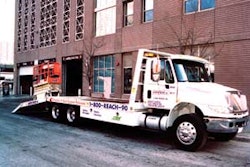This is a tough subject for most business owners. Those considering a sale may agonize over the value of the business, who to sell it to and when to sell it on monthly basis. And when you add a "contracting business" to the mix, it is even worse.
Business transition whims seem to run in cycles. When banks have plenty of available loan money and seem willing to finance just about anything (like now), business owners start wondering if they should sell the business and move on. They figure the market will provide them with an "above-average price", and normally they're right. They are only "right", however, if they pull the trigger and offer the company for sale.
For construction companies, selling to family or existing management seems the easiest way to go. They know the business. They know your vendors. They know your bankers and bonding company. There are numerous reasons to review this alternative over others and, in many cases, it is the proper decision.
Selling to insiders may be easier, but it tends to be less lucrative. Financing may be harder to find. Equity may be in short supply. Personal guarantees may not be worth much. You may get your price, but you may have to wait five to seven years to get it. And during that time, you will need to monitor or somewhat control the budget to protect your interests.
Selling to outsiders can work if they are truly in your business and know the same people you do. In these cases, you will get most of your money up front and be able to walk away into the sunset. This transaction will be strictly business, and will be handled that way.
Put a plan in place
Are you ready to sell? If you said "yes", and you want to maximize value, you could be looking at funding a year from now.
aiting for a hot market to think about selling usually doesn't work — by the time you're ready to sell, the market has typically softened.
The best way to reach your goal of transition and liquidity is to prepare a game plan to sell, then stick to it. So what should be in your plan?
- You need at least three years of clean financials.
- You need to track how you are doing against industry averages.
- You have to either pick an internal successor and lock them in, or determine if an outside sale is the way to go.
- You have to properly value the business so that it is, in fact, sellable.
- You have to work with people who know what they are doing.
- You have to know that your selling price was in the "acceptable range".
- You have to be able to sleep at night.
There are two important areas to cover out of that list — knowing the price is in an acceptable range, and having the buyer locked up. Do these two things and the rest kind of falls into place, allowing you to sleep like a baby throughout the process.
Set a realistic value
The toughest part of the business sale process is finding a price range to work with. You hear all the talk about pricing and multiples, and expect your business to provide the same results. Well, your business can only provide similar results if it generates adequate cash flow to pay off the buyer's loan, or generates sufficient cash flow to pay off the note you signed in addition to any loan entered into. If you want to get paid, make sure the company generates adequate cash flow to fund the deal — especially if you are taking a note back as part of the agreement.
Get a valuation of your business. This is why you will need three years (and maybe even five years) of clean statements. After you decide on a price range, perform the ultimate test and see if you could afford to fund it if you were the buyer. If you can't, that should tell you something. The one thing you don't want to have happen is to keep getting "pie in the sky" offers that will never close. Do that, and you will still be sitting at your desk 10 years from now.
Set the ball in motion
To put a little pressure on yourself, lock a family member or management team member into staying with the company by letting them earn sweat equity in the business. This way, their ownership position is tied to performance and grows based on their performance level. If all goes well, they will have earned enough over three to five years to be able to try to buy out the rest of the ownership. The price for ownership changes annually based on results, and is basically a fixed formula.
Once you have your "internal buyer" picked out, it will be important to provide as much training as possible in order to maximize your success quotient. After watching them operate for a few years, your comfort level may improve to the point where you will be tempted to offer some contingent pricing, or a note with some sort of a balloon balance five years out to help you maximize value. You will, of course, have to keep a tight reign on the company. But those notes could make the difference between getting the deal done or not.
Top dollar for your business is out there. To get it, you need to have a plan. And to make it happen, you have to stick to the plan.



















